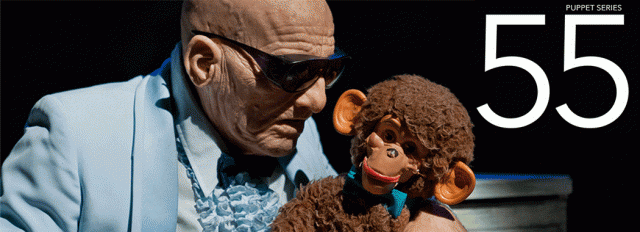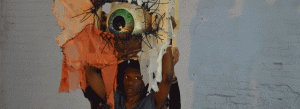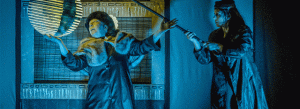
 One of the true gems in the world of New York City off-off-Broadway theatre is La MaMa’s bi-annual Puppet Series, which is now kicking off the company’s 55th season. With a kaleidoscopic presentation of seventy productions upon its numerous stages in the East Village, the 2016 Puppet Series is an eclectic display of some of the leading artists in the world of puppetry today. Started in 2004 by the late Ellen Stewart, founder of La MaMa, the Puppet Series is representative of the company’s long-standing engagement with all forms of puppetry, which began in 1961 with a show from Korea.
One of the true gems in the world of New York City off-off-Broadway theatre is La MaMa’s bi-annual Puppet Series, which is now kicking off the company’s 55th season. With a kaleidoscopic presentation of seventy productions upon its numerous stages in the East Village, the 2016 Puppet Series is an eclectic display of some of the leading artists in the world of puppetry today. Started in 2004 by the late Ellen Stewart, founder of La MaMa, the Puppet Series is representative of the company’s long-standing engagement with all forms of puppetry, which began in 1961 with a show from Korea.
As the 2016 Puppet Series kicks into full gear, the series curator, Denise Greber, talks here with StageBuddy about this exciting event, which runs through November 6.
How have you seen the Series grow or change since it started?
I had been here for about seventeen years so I was here in 2004 working with Ellen to put together that first festival we did and I’ve been doing it ever since. I think that the festivals are growing and in that sense they’ve changed. I think every time we do one, we try to add a little bit more to it, another aspect of it, maybe one more show than we did the year before, or maybe one more program that we didn’t include the year before… so in the beginning we were just doing three shows within the festival, or, as we called it, the Series, and then little by little they’ve expanded to having children’s programming, to having special events where we would do works in progress presentations, or we would invite the Coffeehouse Chronicles to be part of the Puppet Series, as it is this year with Theodora Skipitares being the theme of that particular Coffeehouse Chronicles, her work throughout the years as a puppeteer, as an artist here at La MaMa. We have a puppet slam now, that’s another thing that’s been added over the years inside the Series…
How do you decide what pieces to put in, what sort of qualities do you look for?
Me personally, I’m a big fan of being able to tell stories visually, and I think that’s a big part of why I went towards puppetry, even though I am not myself a puppeteer. I’m very much enamored with theatre, visual theatre, and if you can tell me a good story without too many words and leave me to imagine more, I like that; but it doesn’t mean that I don’t curate puppet shows that have lots of words. So I try to keep an open mind, I try to represent theatre in the biggest sense of the word, and even puppetry theatre has many different types of puppetry, you know, very strong text-based puppetry, other types of puppetry that don’t have any text in them at all, dance puppetry… so, yeah, I really do try to curate different types. But I guess the most important thing is that when I watch it, whether live or through video, or through having conversations with the artists, is that something moves me in some way, whether it be the story that they’re trying to tell or the way the company tells the stories, which is very subjective, I guess. It depends on every individual, what moves them.
How does, say, “puppet” theatre differ from theatre with “actors,” or more “traditional” theatre?
Lately I feel like more and more over the years I’m starting to see that people are just using objects and strong visuals more and more in their theatre, so I’m starting to see a real incorporation of puppetry into what one might even consider just traditional theatre. I think that puppeteers are generally also very well trained actors, they know how to use their bodies and how to express themselves. So, I think there’s becoming less and less difference and more merging of all these different types of universal theatre: theatre that has movement, theatre that has music, and theatre that has a strong story… all these different types of things.

I have noticed that puppets have been popping up a lot in plays where I didn’t expect to see them.
Right, I feel the same thing. But there are lots of theatre companies that do use puppetry in their shows but don’t consider themselves puppet theatres. And again, I think those lines are crossing more and more all the time.
It must be kind of cool dealing with people from all over the world and all these different traditions of puppetry… could you comment on the general experience of putting all this together?
I really enjoy it. I’ve been working here a long time, so one of the things I love so much about being at La MaMa is that we have so many international artists, you know, puppeteers, but there’s also dance companies that come, and theatre companies that come. I really am very much taken with international theatre and getting to know other cultures and other traditions, in this case other puppetry traditions that we don’t normally see here in the States. It’s really great to have them here and represent their traditions or even break those traditions and express something else in a contemporary way. I think it’s really exciting and it’s definitely a big part of the Series. I always am having at least one company coming from somewhere else, represented in some way throughout the Series, and it is important for me to raise that little extra money that is needed to bring companies from abroad, when I can.
What’s the preparation like putting this together, coordinating internationally and all?
I generally take a couple years to put it all together. Before I even finish the festival, I’m already thinking about the other one, who’s coming, especially with the internationals, I feel like I have to get a little ahead of myself because of the money it takes to raise on both sides. We try to raise money here or get extra support from cultural organizations, and we also ask the artists, “Is there any way you can get the airplane tickets paid for over there by your consulate, by your minister of culture?” Definitely, the first ones are the international artists before the U.S. based artists, just because it’s a little more challenging.

How are the audience reactions? I feel like some people might be surprised at the amount of artistry involved in this Series…
Because puppets are something that we have been doing for almost 55 years at La MaMa, we’ve really been able to establish a base of people that are interested in puppetry and know that we do it here, and I think every year our audience gets bigger, especially for these festivals and events because they have an opportunity to again see companies that they’ve not seen before, or that don’t perform that often in New York, even if they’re not international.
Another thing I’ve noticed recently is a lot more multimedia in theatre. How have new technologies changed puppetry?
I think that a lot of puppeteers, if they go that route, they go the media route and the animation route. I think that’s just another form. If you are technologically curious, that’s definitely a way to go with puppetry, merging media with objects. Then there are those traditional puppeteers that just aren’t going to go there; they rely mostly on an actual puppet. But I do think that media and technology is a big part of a lot of puppeteers’ shows. I mean, one of the shows that we’re doing here this season, The God Projekt, it had a run in our 2013 series and we were so taken with it, we just thought it was such an interesting piece, and it was in our club space, which is a smaller 99-seat house, and I saw so much potential in that. I spoke to Mia Yoo, our artistic director, and I said, “Look at this piece, I think there’s something here and we need to explore it more.” And so we worked really hard these past three years and we brought the piece back and it’s now going to present in the Ellen Stewart Theatre, which is our large theatre, and it’s going to be enhanced in different ways, and one of the ways is that there is going to be video in that. So, that’s an example of someone who maybe didn’t have it in his budget, or didn’t have time to get to that part of the show because he was too busy with the other parts of it. It will be interesting to see the show and see how the video in that piece changed it, if it changed anything at all.
And The God Projekt is kind of the centerpiece this year, huh?
Yeah, you know, I’m excited for this piece because I brought it in 2013 and I’ve been working really hard to bring it back. It took me three years, but here it is.
The 2016 La Mama Puppet series continues through November 6. For more information visit: https://lamama.org/puppet_series_2016/
The 2016 La Mama Puppet series continues through November 6.